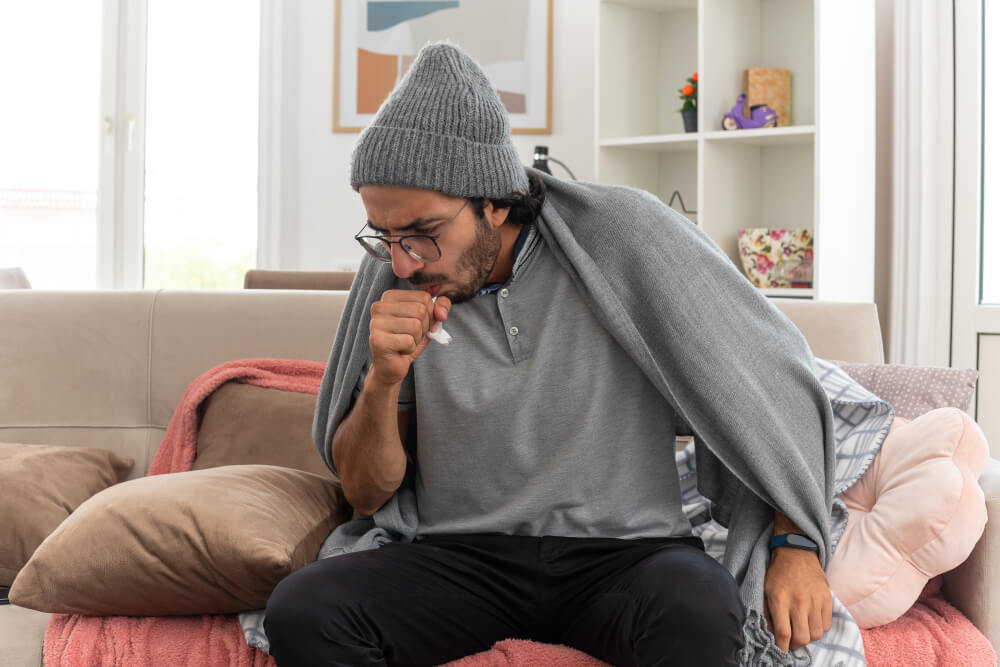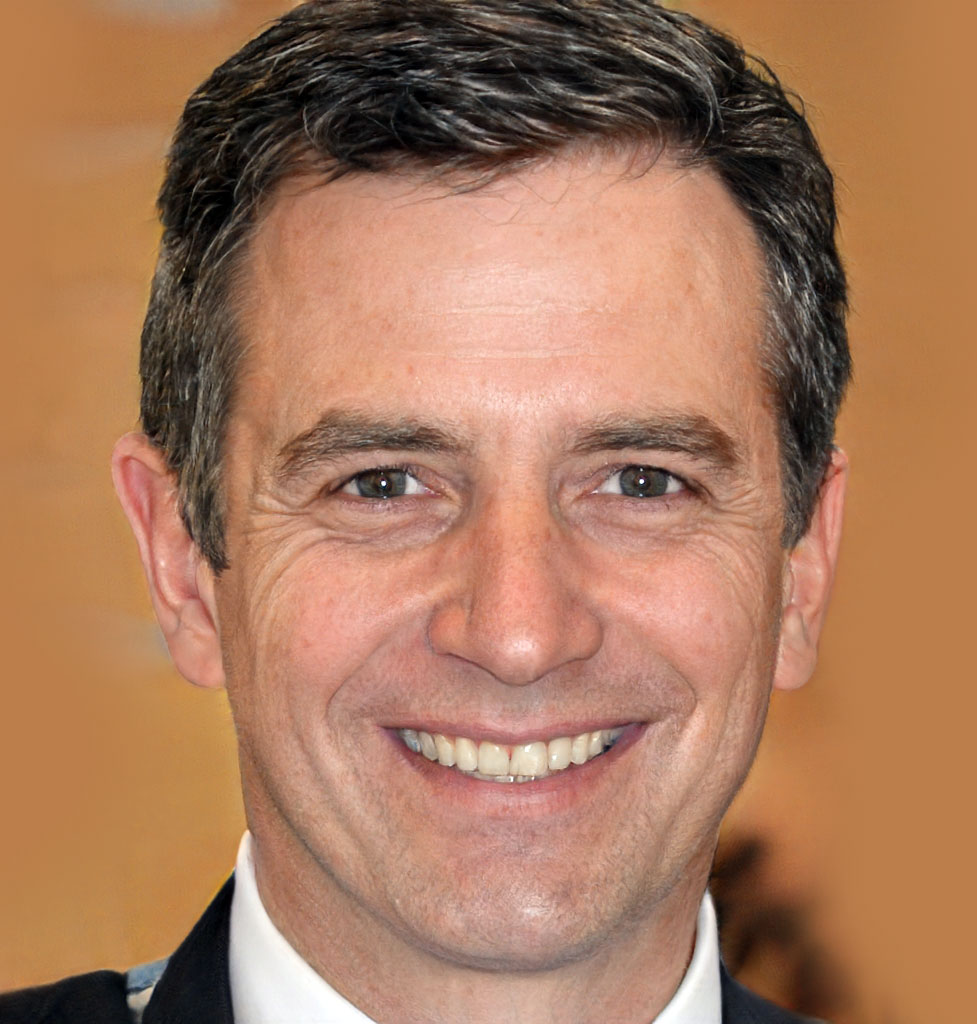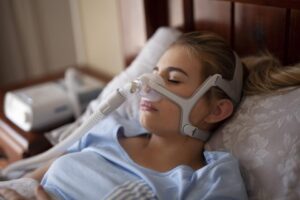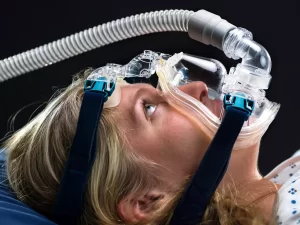Although there are countless benefits to CPAP therapy, there are also CPAP side-effects that make this treatment less than perfect. From these, CPAP cough is one that makes patients lose sleep nights in a row.
Why Does My CPAP Make Me Cough?
Here are some of the most common reasons why your CPAP might be making you cough:
CPAP machines deliver continuous air pressure, which can sometimes be too dry, especially in low-humidity environments. This dry air can irritate your throat and nasal passages, triggering coughing. To combat this:
- Use a humidifier: Most CPAP machines have built-in humidifiers. Ensure it’s filled with distilled water and set to a comfortable level, usually around medium. You can use purified water with your CPAP machine. Don’t use essential oils with CPAP, though.
- Consider a heated hose: Condensation buildup in the hose can further dry out the air. A heated hose can prevent this and deliver warmer, more comfortable air.
Improper CPAP Mask Fit
A leaky mask allows unhumidified room air to mix with the CPAP air, exacerbating dryness and irritation. Also, a mask that’s too tight or ill-fitting can put pressure on your nose and mouth, leading to discomfort and coughs. To address this:
- Check for leaks: Hold the mask in place while the machine is running and listen for hissing sounds. Adjust the straps or try a different mask style for a better seal.
- Ensure comfort: The mask shouldn’t be too tight or loose. Find a snug fit that feels comfortable without applying undue pressure.
High CPAP Air Pressure
Starting at a higher pressure setting can be jarring for your airways, triggering coughing. Consider:
- Adjusting ramp settings: Discuss with your doctor the possibility of lowering the initial pressure and gradually increasing it over time to allow your throat to adjust.
- Trying alternative settings: Depending on your CPAP model, your doctor might suggest experimenting with different pressure settings or therapy modes to find the most comfortable and effective one for you.
Other Potential Causes for CPAP Cough
- Allergies or sensitivities: Cleaning products or materials used in your CPAP equipment could trigger an allergic reaction. Try switching to hypoallergenic cleaning solutions or mask liners.
- Underlying conditions: In some cases, a persistent cough might be unrelated to your CPAP and could be due to conditions like sinusitis or postnasal drip. Consult your doctor if the cough persists despite addressing the above factors.
How to Get Rid of CPAP Cough
A cough that develops from using a Continuous Positive Airway Pressure (CPAP) machine can be bothersome. This cough can be due to the air from the CPAP machine drying out the airways or causing an allergic reaction.
Here are some strategies to help alleviate or prevent a CPAP-induced cough:
Use a Humidifier with Your CPAP Machine
Because CPAP cough is mainly caused by dry air use a humidifier with your CPAP machine. Many modern CPAP machines come with a built-in humidifier. Adjusting the level of humidity can help keep your airways moist and reduce irritation.
Prevent Condensation with Heated Tubing
If your CPAP machine has the option, use heated tubing. This can help keep the air moist and warm, reducing irritation in your airways. Another added benefit is that it reduce the chance for CPAP rainout to appear, as well. If your CPAP machine is also gurgling, you can solve a third problem just by using a heading tube.
CPAP Masks Should Fit Perfectly
Another way to prevent CPAP cough is to ensure your CPAP mask fits well. A mask that leaks can cause dryness and irritation. Consult with your CPAP provider to ensure you have the right mask and fit.
Keep your CPAP equipment clean. Dust, mold, or other allergens can accumulate in the mask or tubing and cause irritation or allergic reactions. Follow the manufacturer’s instructions for cleaning. Read more about How To Clean A CPAP Machine.
Use Allergy Filters
Some CPAP machines have replaceable filters. Make sure they are changed regularly to reduce potential allergens.
CPAP Pressure Settings
Sometimes the pressure settings might be too high, leading to discomfort and coughing. Speak with your healthcare provider about adjusting the settings. Ideally, start with a lower setting and then slowly up the pressure, while also noticing any possible discomfort.
Saline Nasal Sprays
Using a saline nasal spray before bed can help keep your nasal passages moist. Do not use anything over the counter without speaking to your doctor first, as you can do more harm than good.
Stay Hydrated: Drink plenty of fluids throughout the day to keep your mucous membranes moist.
Consult Your Doctor: If the cough persists, it’s important to consult with your healthcare provider. They can check if the cough is related to the CPAP use or if there’s another underlying issue.
Rule Out Infection: Ensure that the cough is not due to a respiratory infection or other illness.
Remember, it’s important not to stop using your CPAP machine without consulting your healthcare provider, even if you suspect it’s causing a cough. They can help you adjust your treatment plan to make it more comfortable and effective.





[…] can help keep your airways moistened during dry weather and high altitudes (it also prevents CPAP cough). If it gets too cold outside, consider bringing along a space heater to keep your tent warm enough […]
[…] making you open your mouth and reducing the therapy’s effectiveness. It can also cause CPAP cough. While turning off the humidifier or using saline spray can offer temporary relief, the best bet […]